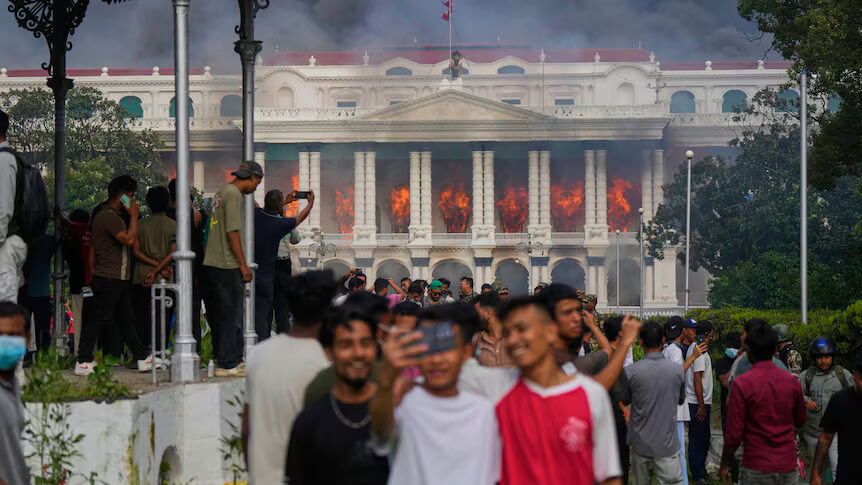Nepal’s extraordinary week ended with a first: former Supreme Court chief justice Sushila Karki was sworn in as interim prime minister after deadly protests toppled the government and parliament was dissolved, with new elections set for 5 March 2026. At least 51 people were killed and more than 1,300 injured, according to official tallies. Reuters
Much of the global discussion has framed this as a fight over “free speech” after a short-lived ban on 26 social media platforms helped ignite the unrest. That’s true—but incomplete. For Nepal’s young people, social media is no longer just a place to talk; it’s a place to work. Pulling the plug didn’t only silence posts; it shut down income streams, customer pipelines and entire micro-businesses. In today’s Nepal, a social-media ban is an economic shutdown by another name. Reuters
Social media is part of Nepal’s economic plumbing
In recent years, Facebook and Instagram have become the front door for thousands of small businesses: discovery, DM-based ordering, customer service, and community building happen there. Local business groups warned explicitly that banning major platforms would trigger immediate sales declines and ripple through a fragile “creator economy” built on ads, brand deals and affiliate links. Even with the ban quickly reversed, the damage—and the message—were clear. New Business Age
This isn’t theoretical. Analyses of Nepal’s e-commerce boom show social platforms are now vital marketing and sales channels, especially for micro-retailers without standalone websites. When those channels go dark, leads dry up, customer questions go unanswered, and fulfillment stalls. 商业360°
Why Gen Z erupted
The ban was the spark; anger at corruption and nepotism was the fuel. A youth-led “Gen Z” movement—already mobilized by a viral “nepo kids” conversation—took the streets after police used lethal force during earlier clashes. Their message: if the political class enjoys privilege while jobs are scarce and digital side hustles are throttled, something has to give. 卫报
Look at the jobs picture. Nepal’s youth unemployment sits around 20–21% in recent data—stubbornly high by global standards—and millions of Nepalis seek work abroad. For many, creators’ income, online tutoring, remote gigs and micro-commerce fill the gap. Disabling the tools that make that possible felt less like “content moderation” and more like income confiscation. FRED
A five-day blackout with long shadows
The government’s attempt to force platform registration triggered a five-day blackout before a hasty reversal—but by then momentum had shifted. Protesters stormed and set fire to key government buildings, Prime Minister K.P. Sharma Oli resigned, and the army stepped in to stabilize the capital. The sequence underlined a lesson every policymaker now faces: you cannot sever digital lifelines without real-world economic and political blowback. Reuters
There’s also history here. Nepal already banned TikTok in 2023, citing social harms. That earlier switch-off foreshadowed how blunt digital controls can collide with livelihoods, especially when alternatives and due-process safeguards are thin. SSRN
What the Karki interim government must do—fast
Karki’s reputation for integrity gives her an opening, but the to-do list is daunting:
- Guarantee digital due process. Replace ad-hoc blackouts with clear, court-reviewable rules for content moderation and platform compliance. Emergency orders should be time-bound, narrowly tailored, and paired with transparency reports. This keeps platforms accountable without collateral damage to income. (Context: the ban’s rollback and subsequent appointment followed days of negotiations among the president, army chief and protest leaders.) Reuters
- Ring-fence the creator and micro-business economy. Create a small-seller charter: fast KYC for online merchants, simplified tax thresholds, and guidance for shifting from DM-only sales to basic storefronts (while keeping social discovery). This protects the businesses that Nepal’s own industry groups say rely most on social channels. New Business Age
- Investigate protest deaths with independence. An impartial commission with prosecutorial power is essential to restore trust after the week’s 51 deaths, including protesters and police. Public timelines and victim compensation should be non-negotiable. Reuters
- Rebuild—and renew. Beyond repairing Singha Durbar and parliament, hardwire youth oversight into procurement and anti-corruption mechanisms—e.g., open-contracting portals and a protected youth whistleblower channel.
- Protect the election calendar. The legitimacy of March 5, 2026 elections will depend on a level playing field online (no partisan throttling), equal platform access for candidates, and lawful, precisely targeted counter-disinformation measures. Reuters
The bigger idea: Digital rights are economic rights
For a generation that learned, networked and earned online through a decade of crisis—from earthquakes to pandemics—platform access is intertwined with basic economic security. You can debate algorithms and foreign tech power; you cannot ignore that in 2025, cutting speech tools often means cutting paychecks.
Karki’s interim government doesn’t have to be pro-platform; it must be pro-people. That means moving from blunt bans to smarter regulation; from opaque decrees to measurable safeguards; and from a politics of privilege to a politics that recognizes the everyday digital hustle as real work.
If Nepal gets that right, the week that began with flames could end up being remembered as the moment the country rewired its democracy and its digital economy for the people who need it most—the young.
※新西兰全搜索©️版权所有
敬请关注新西兰全搜索New Zealand Review 在各大社交媒体平台的公众号。从这里读懂新西兰!️
了解 新西兰全搜索🔍 的更多信息
订阅后即可通过电子邮件收到最新文章。




